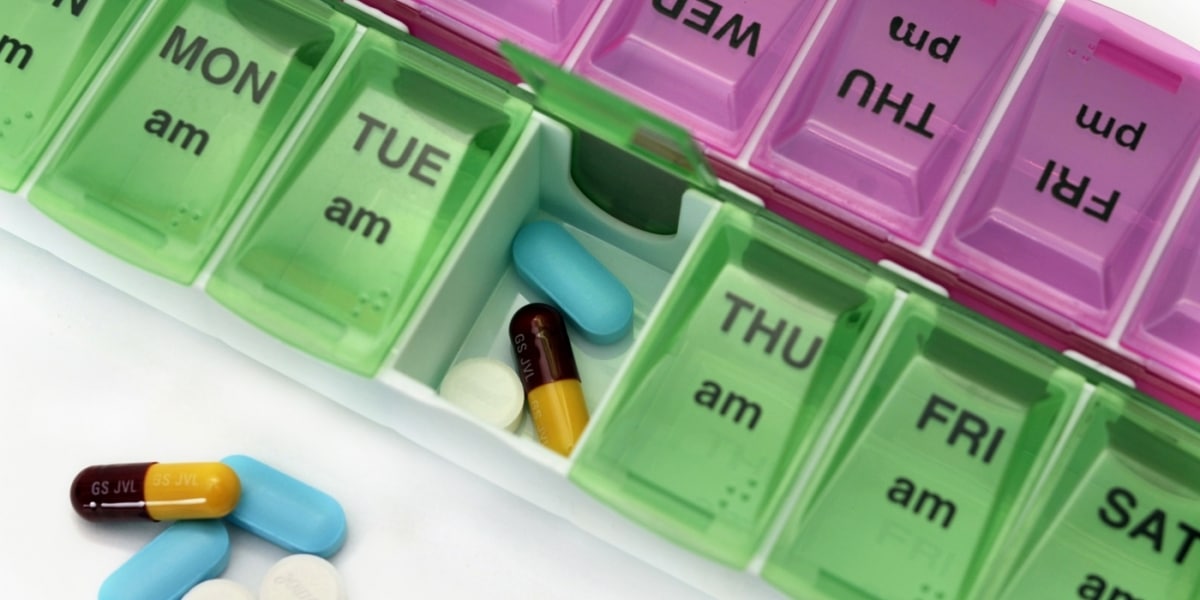
Did you know? Up to 58% of all seniors make an error when taking their medications, and 26% of those are making mistakes with “potentially serious consequences.” These are disheartening statistics—but it doesn’t have to be this way. With proper medication management, as a caregiver you can ensure that your senior is taking their medications correctly and safely. Below we’ve listed 10 tips to help you craft an effective medication management plan, so your elderly loved one or patient can feel their best and live the best quality of life possible.
1) Maintain an up-to-date list of all medications
Keeping an up-to date list of medications will help eliminate any confusion when it comes to your senior’s medication regimen, and keep you organized. This list should include the names of both prescription and over-the-counter medications, dosage, frequency taken, and the reason for taking the medication.
2) Follow medication instructions
It may seem obvious—but following all instructions to a ‘T’ is a must. Besides dosage, pay attention to special instructions including whether a medication should be taken with food, or if there’s a certain time of day that’s best for effective treatment.
3) Know the side effects
Knowing the side effects of the medications your senior is taking will help you know immediately if it’s causing adverse effects. Be especially observant if a new medication is being introduced. If any health changes occur, or you suspect a medication is having a negative impact, contact your senior’s doctor immediately so the problem can be properly diagnosed.
4) Stay educated about drug interactions
Just as you should be aware of side effects of individual medications, you should also know how different medications can interact, and make note of which ones your senior should avoid taking. Luckily, there are plenty of online tools like AARP’s drug interaction checker to help with this. While these tools are helpful, it’s important to share any concerns about potentially negative drug interactions to your senior’s doctor or pharmacist.
5) Keep medications organized
Most seniors have multiple prescriptions, which means multiple pill bottles that can create confusion with consequences if they aren’t organized properly. Presorting medications weekly into a pillbox labeled with the days of the week that has AM and PM compartments can be helpful. Systems like this allow you and your senior to know what needs to be taken on what day and when. Otherwise, medications should be kept in their original containers to avoid any mix-ups.
6) Safely store medications
Follow the instructions that come with the prescribed or over-the-counter medications to make sure you’re storing them properly. Failing to do so can hinder the effectiveness or result in dangerous side effects.
7) Set helpful reminders
As a caregiver, you’re likely juggling multiple responsibilities during the day. With so many tasks to keep track of, it’s only human to forget one occasionally. However, forgetting a dose of medication can have serious consequences. These days, there are plenty of tools that exist to prevent this from happening, and there truly is an app for everything. Consider downloading one like the Medisafe Pill Reminder and Medication Tracker. No matter how you choose to go about it, setting up a reminder system is a must to help you stay on track with your senior’s medication management.
8) Communicate with your senior’s doctor
When visiting the doctor, a medication list should be taken along. The more your senior’s doctor knows about their medical history, the more accurate they can be when prescribing medications. If you have any concerns, or if your loved one is experiencing any side effects, be sure to communicate what’s going on, and don’t be afraid to ask questions.
9) Don’t be afraid to get a second opinion
Not all doctors are alike, and some will prescribe medications differently than others. If you have any doubts, or feel that the wrong medication has been prescribed (or too much of a medication), don’t hesitate to reach out to another physician for a second opinion.
10) Use one pharmacy if possible
When it comes to medication management, the more streamlined your plan can be, the better. Having one designated pharmacy means better communication and less of a chance for any mix ups to occur. It will also make it easier for you as the caregiver to have one destination for picking up medication, instead of having to make multiple stops—which increases the risk of forgetting a stop (and an important prescription) along the way.
Whether you’re looking for additional caregiver support, or seeking long-term care for you or your loved ones, we can help! Loretto is proud to offer 19 specialized programs and facilities with over 2,500 dedicated caregivers, providing a system of care that addresses the unique needs of every individual. Contact us today to learn more!
